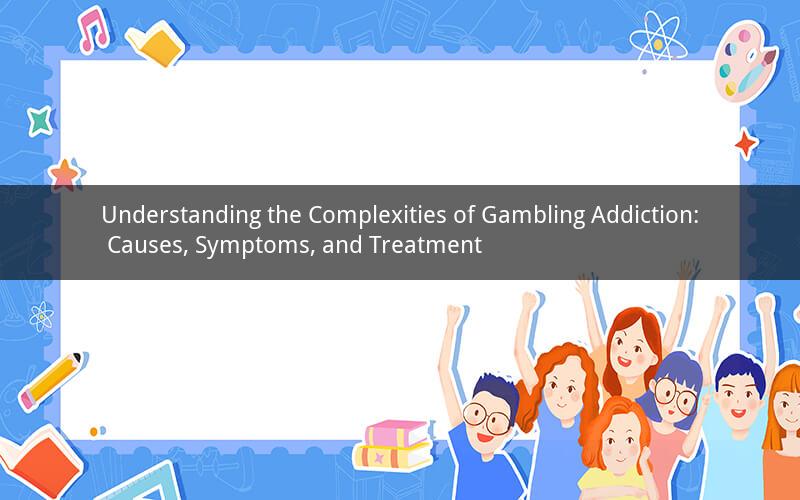
Gambling addiction, often referred to as problem gambling or compulsive gambling, is a serious condition that affects millions of individuals worldwide. It involves an uncontrollable urge to gamble, despite negative consequences in various aspects of life. This article delves into the causes, symptoms, and treatment options for gambling addiction, aiming to provide a comprehensive understanding of this complex issue.
Causes of Gambling Addiction
1. Genetic Factors: Research suggests that genetics play a significant role in the development of gambling addiction. Individuals with a family history of addiction are more likely to develop gambling problems.
2. Environmental Influences: Exposure to gambling activities, such as visiting casinos or watching gambling-related media, can increase the likelihood of developing an addiction. Peer pressure and the desire to fit in with a gambling-oriented social circle can also contribute to the development of gambling addiction.
3. Psychological Factors: Individuals with certain personality traits, such as impulsivity, thrill-seeking, and low self-esteem, may be more susceptible to developing gambling addiction. Additionally, those who have experienced trauma or have mental health issues like depression or anxiety may turn to gambling as a coping mechanism.
Symptoms of Gambling Addiction
1. Loss of Control: A gambling addict may find it difficult to control their gambling behavior, even when they know it's causing harm. They may continue to gamble despite repeated attempts to stop.
2. Preoccupation: Thoughts about gambling may dominate a person's life, making it challenging to focus on other responsibilities or interests.
3. Financial Consequences: Problem gamblers often experience significant financial difficulties due to their gambling habits. This may include accumulating debt, losing savings, or stealing money to fund gambling activities.
4. Relationship Issues: Gambling addiction can strain relationships with family, friends, and partners. Lying about gambling, neglecting responsibilities, and prioritizing gambling over loved ones are common symptoms.
5. Emotional and Physical Health Problems: Problem gamblers may experience increased stress, anxiety, and depression as a result of their addiction. Physical health issues, such as sleep disorders and malnutrition, can also arise from neglecting personal care.
Treatment for Gambling Addiction
1. Therapy: Cognitive-behavioral therapy (CBT) is an effective treatment for gambling addiction. CBT helps individuals identify and change negative thought patterns and behaviors associated with gambling.
2. Support Groups: Joining a support group, such as Gamblers Anonymous, can provide individuals with a sense of community and support. Sharing experiences with others who understand the challenges of gambling addiction can be incredibly beneficial.
3. Medication: In some cases, medication may be prescribed to help manage symptoms of depression, anxiety, or other mental health issues that contribute to gambling addiction.
4. Financial Counseling: Working with a financial counselor can help individuals develop strategies to manage their finances and address gambling-related debt.
5. Inpatient or Outpatient Treatment: Inpatient treatment programs provide a structured environment for individuals struggling with gambling addiction. Outpatient programs offer more flexibility, allowing individuals to continue with their daily responsibilities while receiving treatment.
Frequently Asked Questions
1. What is the difference between problem gambling and gambling addiction?
Answer: Problem gambling refers to any gambling behavior that causes harm, while gambling addiction is a severe form of problem gambling characterized by an uncontrollable urge to gamble.
2. Can gambling addiction be cured?
Answer: While there is no guaranteed cure for gambling addiction, treatment can help individuals manage their symptoms and reduce the risk of relapse.
3. How can I tell if someone has a gambling addiction?
Answer: Look for signs such as preoccupation with gambling, financial difficulties, neglecting responsibilities, and strained relationships. If you suspect someone has a gambling addiction, encourage them to seek help.
4. Is it possible to prevent gambling addiction?
Answer: While there is no foolproof way to prevent gambling addiction, being aware of the risks and taking steps to limit exposure to gambling activities can help reduce the likelihood of developing an addiction.
5. Can a person recover from gambling addiction without treatment?
Answer: While some individuals may recover from gambling addiction without treatment, seeking professional help can significantly improve the chances of long-term recovery and reduce the risk of relapse.